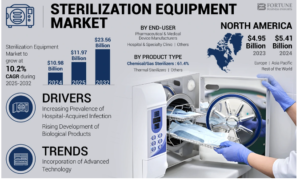The global sterilization equipment market was valued at USD 10.98 billion in 2024 and is expected to reach USD 11.97 billion in 2025. It is projected to grow significantly, reaching USD 23.56 billion by 2032, with a compound annual growth rate (CAGR) of 10.2% over the forecast period.
The sterilization equipment market is expanding steadily due to increasing awareness about infection control, rising surgical procedures, and the growing emphasis on maintaining sterile environments in healthcare facilities. This market includes a wide range of equipment such as autoclaves, ethylene oxide sterilizers, low-temperature sterilizers, and radiation-based systems, all essential for eliminating harmful microorganisms from medical instruments and devices. Hospitals, clinics, pharmaceutical companies, and research laboratories are major end-users of sterilization equipment. Additionally, technological advancements such as automation, eco-friendly sterilization methods, and integration with digital monitoring systems are enhancing efficiency and compliance. As healthcare standards continue to rise globally and regulatory bodies enforce strict hygiene protocols, the demand for effective sterilization solutions is expected to grow consistently.
Continue reading for more details:
https://www.fortunebusinessinsights.com/sterilization-equipment-market-108681
Market Segmentation
- By Equipment Type: Includes steam autoclaves, ethylene oxide sterilizers, hydrogen peroxide plasma, dry heat, and radiation systems—diverse product lines within the sterilization equipment market.
- By End‑User: Segmented across hospitals, pharmaceutical manufacturers, biotechnology labs, food & beverage plants, and veterinary clinics, each utilizing different sterilization equipment market offerings.
- By Application: Covers medical device sterilization, pharmaceutical processing, laboratory equipment, food safety operations, and cosmetic manufacturing—key application areas in the sterilization equipment market.
- By Technology: Categorized into conventional sterilization, low-temperature sterilization, high-efficiency systems, and cloud‑connected validation tools within the sterilization equipment market.
- By Region: Major regions include North America, Europe, Asia‑Pacific, Latin America, Middle East & Africa, each presenting unique demand drivers for the sterilization equipment market.
List Of Top Sterilization Equipment Companies:
- STERIS (U.S.)
- Getinge AB (Sweden)
- ASP (U.S.)
- 3M (U.S.)
- Cardinal Health (U.S.)
- MMM Group (Germany)
- MATACHANA (Spain)
- Andersen Sterilizers (U.S.)
- Noxilizer Inc. (U.S.)
- Continental Equipment Company (U.S.)

Market Growth:
The sterilization equipment market is expected to continue expanding at a robust pace. Growth is driven by factors such as the rising number of surgical procedures, increased use of reusable medical devices, and growing healthcare infrastructure in emerging economies. The market is also benefitting from technological advancements, including low-temperature sterilization systems, automated sterilizers, and eco-friendly sterilization methods that reduce energy and water consumption.
Regional Analysis:
- North America dominates the sterilization equipment market thanks to mature healthcare infrastructure, strong regulatory frameworks, and emphasis on infection control.
- Europe shows stable growth in the sterilization equipment market, supported by strict FDA and CE regulatory standards, and widespread adoption in pharmaceutical and diagnostics industries.
- Asia‑Pacific is the fastest-growing region in the sterilization equipment market, propelled by expanding healthcare access, rising medical tourism, and increasing pharmaceutical manufacturing.
- Latin America is gradually expanding in the sterilization equipment market, with growing investments in hospital infrastructure and industrial sterilization following global best practices.
- Middle East & Africa are emerging markets for the sterilization equipment market, with rising awareness, donor-funded healthcare programs, and adoption in research and food safety segments.